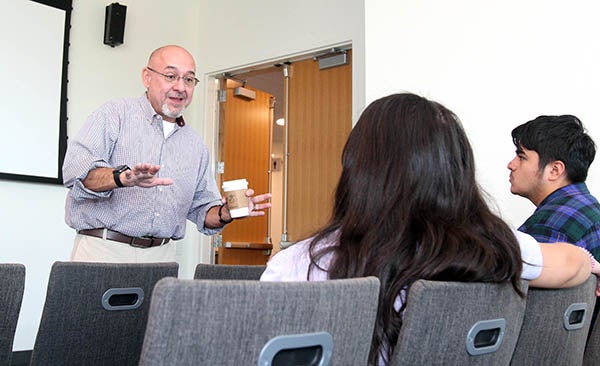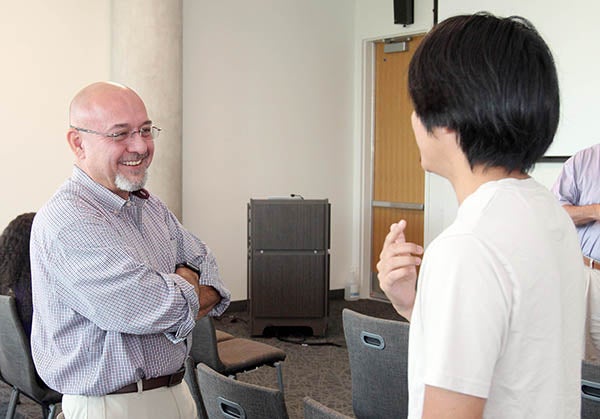ECU alumnus offers academic, career advice to students
Pablo Hernández didn’t know English. He learned it.
His parents didn’t go to college. He did.
Growing up in Venezuela, he came to America, accepting an unpaid internship because he knew it would create opportunities later.
“It’s steps, little steps,” Hernández said. “And you use those to build the next steps.”

Pablo Hernández, the director of project management services at 35 North in Durham and an East Carolina University alumnus, talks with students in the Main Campus Student Center. (ECU photos by Ken Buday)
Hernández, an East Carolina University alumnus and director of project management services at 35 North in Durham, returned to Greenville as a guest of the College of Engineering and Technology’s Student Success Center. As part of National Hispanic Heritage Month, he met with students in the Main Campus Student Center, talking about his journey as a first-generation college student whose first language was not English and offering career and academic advice.
He said first-generation college students face many challenges, which can be compounded for those who grew up in homes in which English was not spoken often. He said determination, grit and hard work — characteristics of many ECU students — are required to overcome those challenges.
While attending college in Venezuela, Hernández came to the United States for an internship in the early 1990s.
“I had to make sacrifices. I didn’t get paid for that internship,” he said. “They paid my expenses, but I didn’t get paid for my internship.”
With a background in computer science and engineering, he eventually landed permanent jobs and earned his Master of Business Administration from ECU in 2005. He has held a variety of leadership positions for several companies such as DuPont and Syngenta.
“If you’re an engineer or construction management, you don’t have to do that your whole life. You can change your career,” he told the students.
Student challenges
He said many first-generation and English as a second language students face unique challenges, one of which is imposter syndrome.
“I still feel it. You feel like you’re not smart enough,” he said. “That’s not true. You’re here. You are smart. You’ve earned it. You’ve worked your butts off.”
He said students need to take advantage of available financial resources that ECU offers and ask for help when needed.
“My parents didn’t understand anything about college,” he said. “It’s not their fault. They just never experienced it. So go to your advisors. Ask for help.”
Keys to success
Hernández told students that he wished he had been more active during his collegiate years.
“Get involved. Enjoy ECU. Don’t be in a rush. It’s not a race. Enjoy the university,” he said.
That involvement could be through student organizations or by creating study groups among peers.
And he told his audience that not everything is about that next test, quiz or assignment.
“Don’t forget about the things that are important — your mental wellness and your physical wellness,” he said.
Career planning
Hernández said the four programs in the College of Engineering and Technology — computer science, construction management, engineering and technology systems — provide the types of employees needed at 35 North, a construction project management firm that focuses on life sciences.

Hernández advised students to get involved on campus, use available resources and take care of their mental and physical health as ways to overcome challenges.
“I could use almost anybody from this college,” he said.
He pointed out that industries that fit the college’s programs such as life sciences, agricultural and clean technology, cybersecurity and advanced manufacturing all have high projected job growth and can net six-figure annual salaries. He said the Research Triangle Park region in Raleigh had $11.6 billion in construction in 2022 alone.
“The economy is growing and there’s a lot of movement,” he said.
He advised students to take advantage of the career fairs on Wednesday, telling them to target companies and learn all they could about them.
“I don’t like it if someone comes up to me and asks what we do,” said Hernández, who plans to represent 35 North at Wednesday’s fairs. “Know what they do and know what you want to do. Shake hands. Show them you’re interested, why you’re interested and what you’re looking for.”
He said the educational aspects of a resume aren’t as important as knowing the company, dressing well and showing interest.
“The technical aspects are important, but what I’m looking for mostly is personality, someone who has energy and who wants to work and do things,” Hernández said. “ECU will take care of the education. I’m looking for personality.”
He told students to rely on their strengths to enjoy successful careers.
“You’re resilient, you’re determined, you’re resourceful, but you’re going to fail at some point,” he said. “When that happens, check it off and get to work again.”
And they shouldn’t sell themselves short.
“It’s easy for you to think that everybody can do it, but believe me, it’s not that easy,” he said. “Not everyone can do it.”
For more information about the upcoming career fairs, visit the ECU Career Services website.